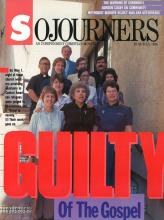At the time of the interview, Peggy Hutchison was a United Methodist, director of border ministry for the Tucson Metropolitan Ministry, a graduate student in Middle East Studies at the University of Arizona and married to Michael Eisner. —The Editors
Sojourners: What kind of experience has the trial been for you?
Peggy Hutchison: For me it's been like a tragedy and a comedy. There are times when I've laughed so hard I'd cry. And there are times when I have literally cried. Probably the most painful part has been sitting there silently while the refugees have to testify. They are robbed of all their emotions, all of their humanity. They aren't given any dignity and respect. And we had to just sit there silently and not say anything. That was very painful.
I don't like being there. I didn't choose it; none of us did. And though we're 11 defendants, we're very different—theologically and politically. The one thing we have in common is our concern about refugees. The government brought us together, and that's been difficult, to be honest with you. But it's been a blessing, and I think we've learned from it.
Some of the things that we've struggled with for many years working in sanctuary are the same things we continue to struggle with in the context of the courtroom. Through this trial experience, I've relearned the importance of interpersonal relationships. I think that those of us in sanctuary, as well as other movements of the church or of the religious community, have tried to be there with each other when one of us has fallen on the sidelines. We have tried to be present with each other along this struggle.
Read the Full Article
